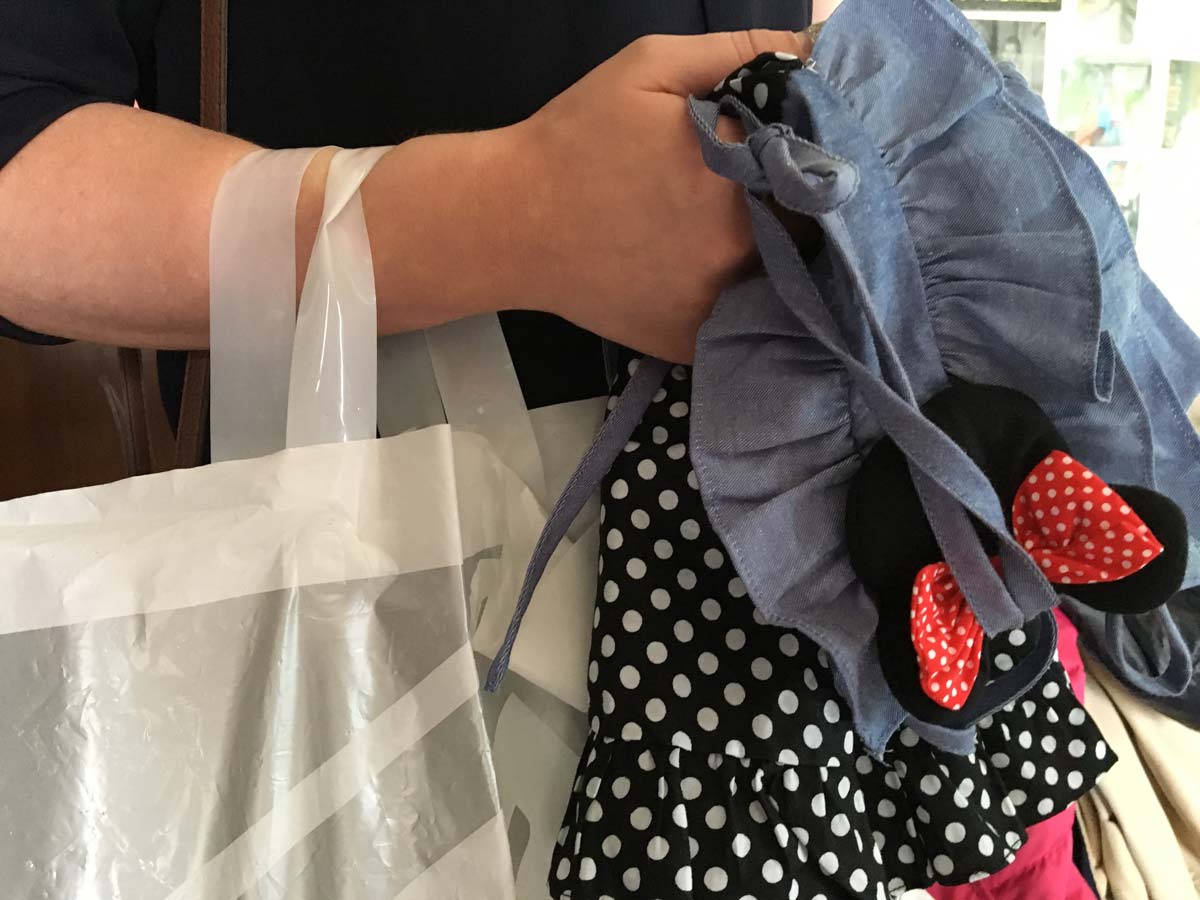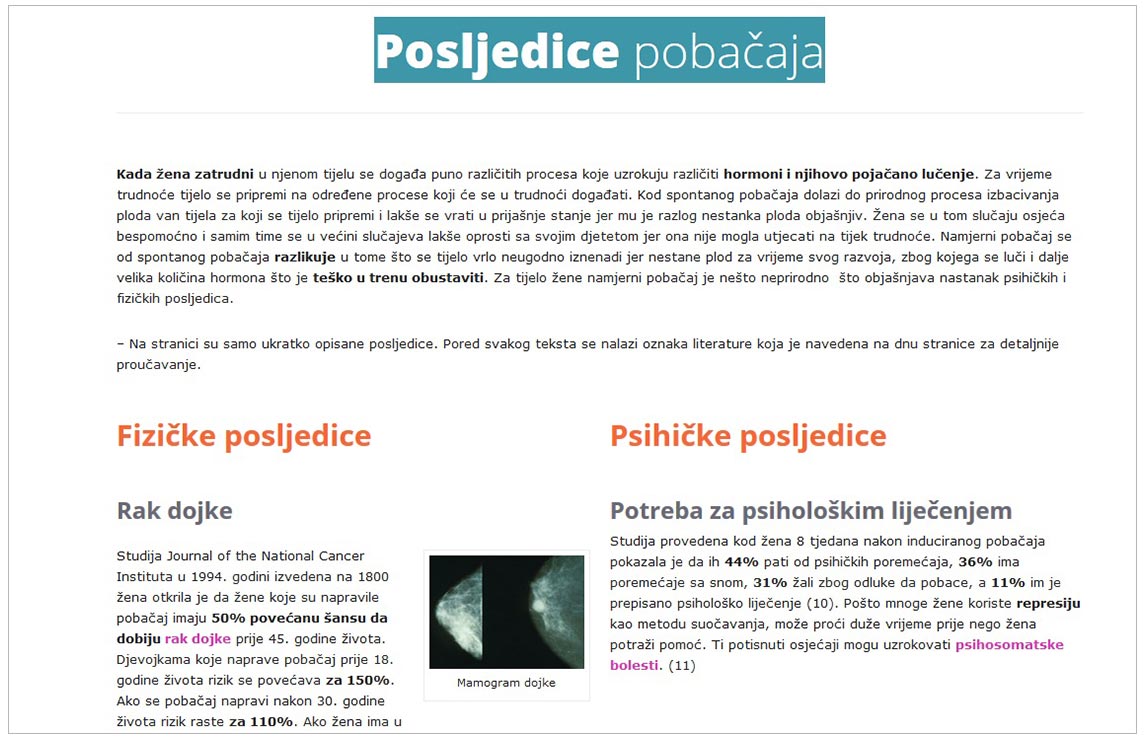The first thing one notices upon entering the cramped Zagreb office of Baby Sunshine, a Croatian charity that helps young mothers in need, is a large red poster of a pregnant woman with the words, "Human rights progress when there is life". Beneath the poster, an array of plastic fetuses and statuettes of the Virgin Mary lie stacked on shelves.
"Come on in, Natalia doesn’t have much time," says Bosiljka Bacura, the charity’s manager, waving us into the dark and cluttered room. A 26-year-old mother of four, Natalia has to pick up her children from her cousin’s house, she explains. We shuffle our way past baby clothes hanging on a rack to sit down and listen to her story.
"You know, I had my first three children in rapid succession," Natalia starts off. "When I discovered I was pregnant again I couldn’t believe it. I didn’t sleep for a month," she recalls. "We have no money, it was inconceivable that we’d have another child in the house. I was terrified and kept having horrible nightmares."
Disoriented and distraught, Natalia began looking for a "solution" to her problem. "I wanted to have an abortion," she says candidly. Abortions have been legal in Croatia since 1978, but only within the first 10 weeks of pregnancy. An Internet search for the terms "have an abortion" led the young mother to the website of a private clinic. There, a woman "who evidently worked in gynecology" put her in touch with Bacura’s charity. "I was told she would be of great help," Natalia recalls.
The two women had a long conversation over the phone. "I told her I was scared at the idea of having another baby and that I was thinking of having an abortion," says the young mother. "She simply answered that the child already represented life." They rapidly arranged to meet. "When she asked me how I would feel if I didn’t have my three kids, I ended up changing my mind," Natalia adds. In June 2017, she gave birth to her fourth child, Paola.

If they were a little brighter, they would see it for themselves"
— Bosiljka Bacura
A year on, Natalia says she is happy she changed her mind.
"Thank God I made the right decision. This baby is a wonderful gift and I’m extremely grateful to Mrs Bosiljka. She helped me a lot and still does," she adds, before dashing off with a Minnie Mouse skirt and two packs of nappies.
Many Croatian women seeking information about abortions end up on the same website as Natalia, one that is particularly well referenced on Internet search engines. As a result they are directed towards anti-abortion groups that have but one aim: persuading them to carry their pregnancy to term.
Bacura has no qualms about the very partial information provided. "If these girls were a little brighter, they would see it for themselves," she quips once the mother has left. The website describes itself as an "information portal" and has a deceptively official look. And yet it doesn’t give a single address for where abortions are performed. Some of the information provided is false or fanciful. For instance, the list of "physical and psychological consequences of abortion" includes "breast, uterine and ovarian cancer" as well as "alcohol abuse, sex issues and post-traumatic stress".

The anti-abortion website lists breast cancer among the supposed "physical and psychological consequences of abortion".
The charity manager recognises that the website was set up by pro-life Croatians, whom she describes as "very good people". At 70, she proudly claims to have "saved a thousand lives" over the past 25 years and helped hundreds of mothers in need. Bacura, who was trained in Germany, acknowledges her use of psychological methods to instil doubt in young women like Natalia. "When they call to ask how much an abortion costs I tell them that, before they go ahead, they should know it is not a trivial operation," she says. "When they come to see me, I tell them: ‘Inside you, there is a child who is alive’, and then I show them an infant bodysuit to move them."
Determined to dissuade women from termination, Bacura stages a mock procedure using a plastic fetus. Her aim is to show, as she puts it, "how they [the doctors] enlarge the uterus and then use scissors to cut up the fetus". Blasting the "dirty money" that hospitals make from carrying out abortions, she adds: "I told Natalia I didn’t want them to hurt her belly."
While several rights groups have denounced this disinformation campaign, Croatian authorities are yet to take any action. In 2016, the proliferation of similar websites pushed the French government to draft a law outlawing sites that pose as neutral sources of information while promoting anti-abortion propaganda.
These groups are very well organised"
— Jasenka Grujic
Bacura is part of an increasingly influential movement in Croatia. Since the conservative HDZ party rose to power in 2016, several "March for Life" rallies have been held in Zagreb, gathering between 10,000 and 20,000 people on the streets of the Croatian capital. The protests, organised by conservative and Catholic groups, call for "respect for human life from conception to natural death". Members of the 40 Days for Life campaign have also held prayer vigils outside public hospitals, the only places where abortions are legally carried out.
"These groups are very well organised and their rhetoric is well-rehearsed," says Jasenka Grujic, a gynecologist who campaigns for women’s right to choose for themselves. "They speak of ‘lives’ and ‘hearts’ when talking about fetuses in order to strike a chord with public opinion. But they never take the women’s best interest into account."
In a country that has one of the lowest abortion rates in Europe, the pro-life camp has recently scored a legal victory with potentially far-reaching repercussions. In March 2017, Croatia’s Constitutional Court rejected the Catholic Church’s latest attempt to scrap the law legalising abortion, which dates back to Yugoslav times. However, the court also ordered parliament to write a new version of the law by the spring of 2019. The verdict signaled a victory for the Church, which has positioned itself as the custodian of national identity ever since Croatia won its independence in 1990.
Fearing a complete overhaul of the law, rights groups organise regular workshops with gynecologists to raise awareness of the issue and press for more – not fewer – rights for women.
"The law needs to be modernised," says Grujic, a doctor with 40 years of experience in the profession. "But it mustn’t restrict women’s rights," she adds. "It needs to protect them even more!"
They never take the women’s best interest into account"
— Jasenka Grujic
In order to do so, Grujic wants to crack down on the so-called conscientious objectors who refuse to help terminate pregnancies. It is estimated that one in two gynecologists in Croatia object to performing abortions. "It’s an absolute scandal that none of the doctors in a Zagreb hospital are willing to do their duty," she fumes, noting that the obstruction results in a waste of precious time for women, who have a 10-week deadline to meet.
"Of course, women in the capital can turn to another public hospital. But in a city like Split, in the south, where only one doctor agrees to perform abortions in a hospital, women who face an urgent situation can easily end up in danger," Grujic explains, arguing that all gynecologists should be capable of carrying out the procedure.
"I’m 67 and I will fight until the end to ensure abortion doesn’t become illegal again," she says, warning against a return to a "painful past" for women. "I refuse to see Croatia become like Malta!"









